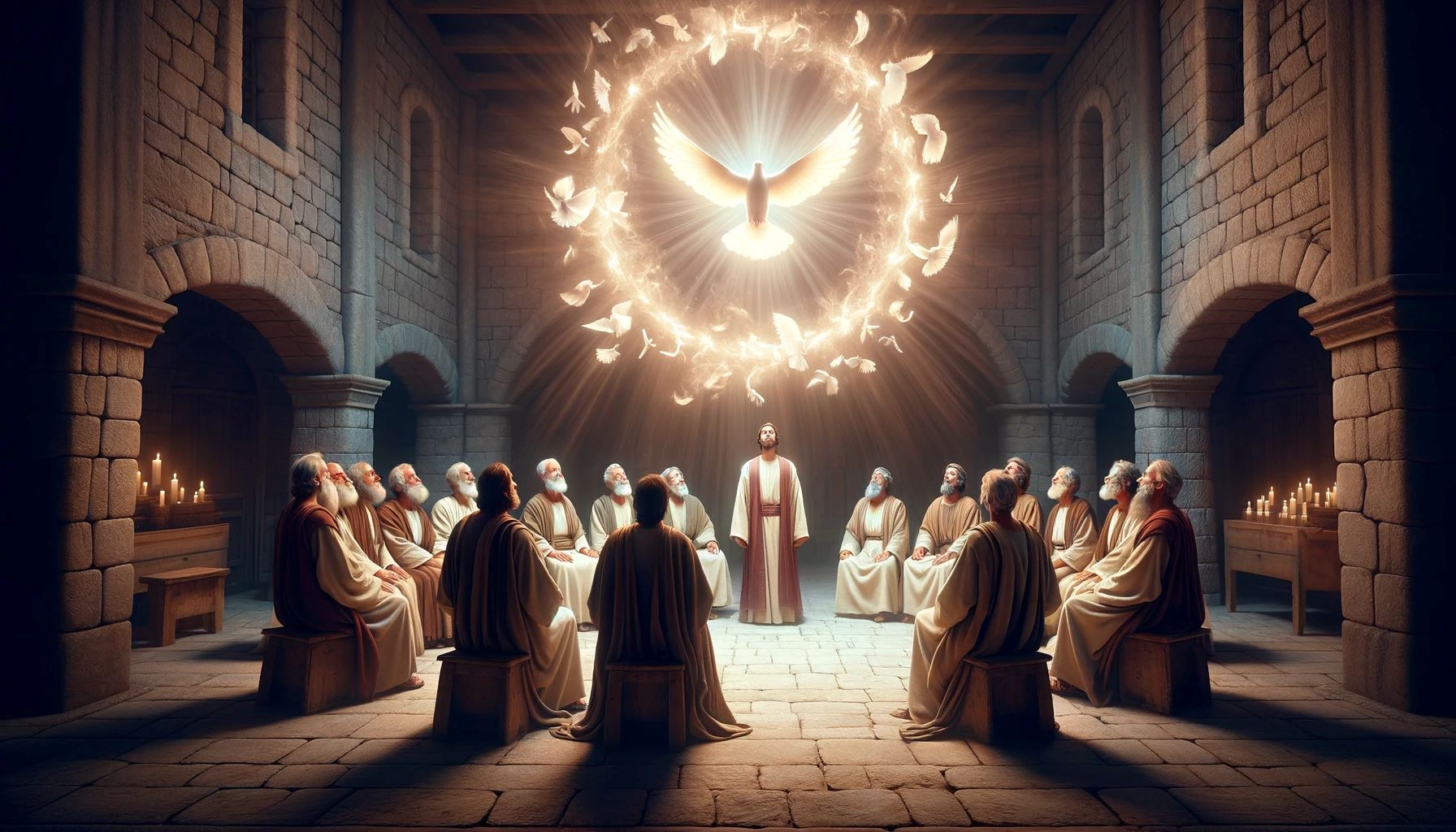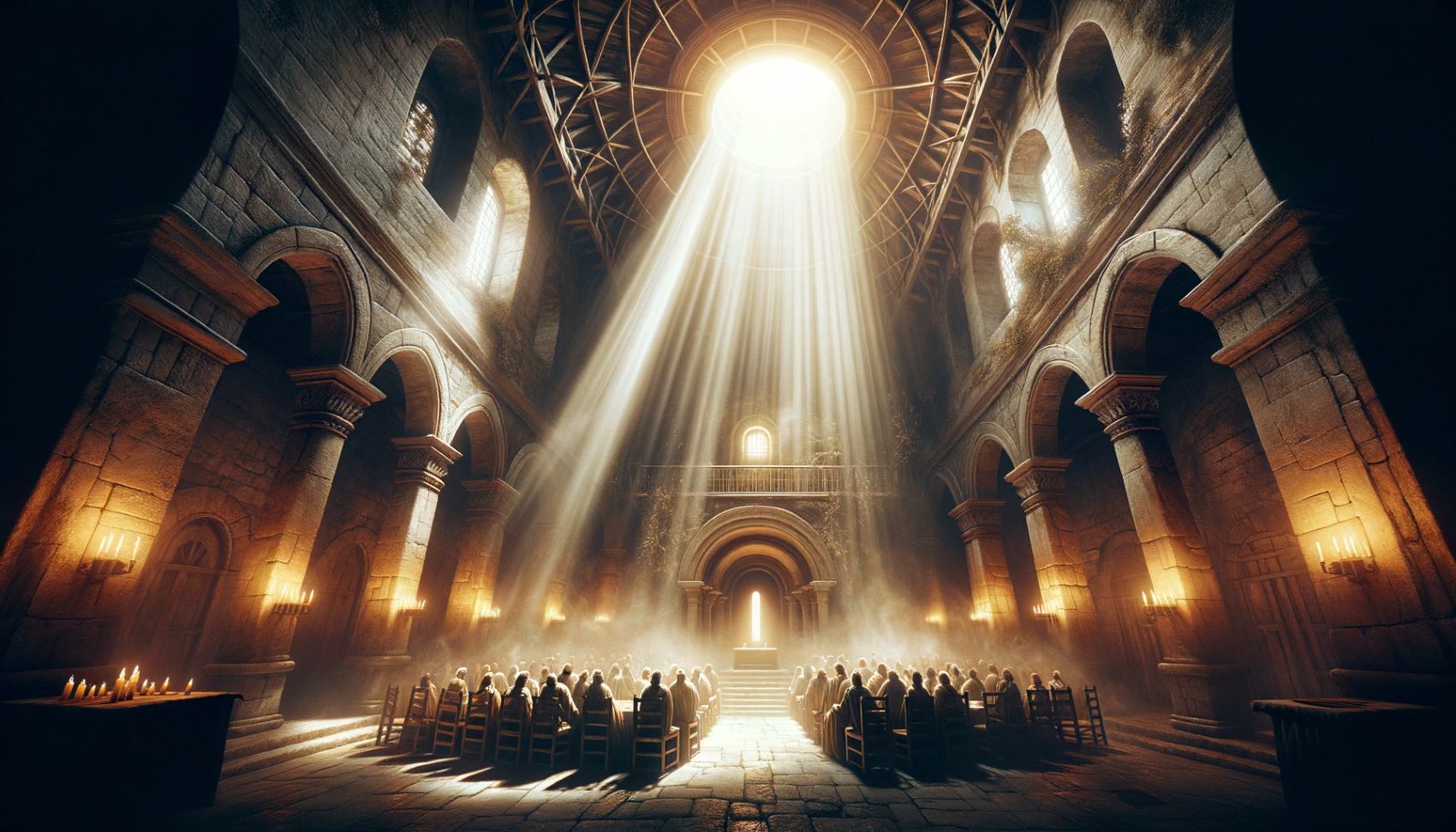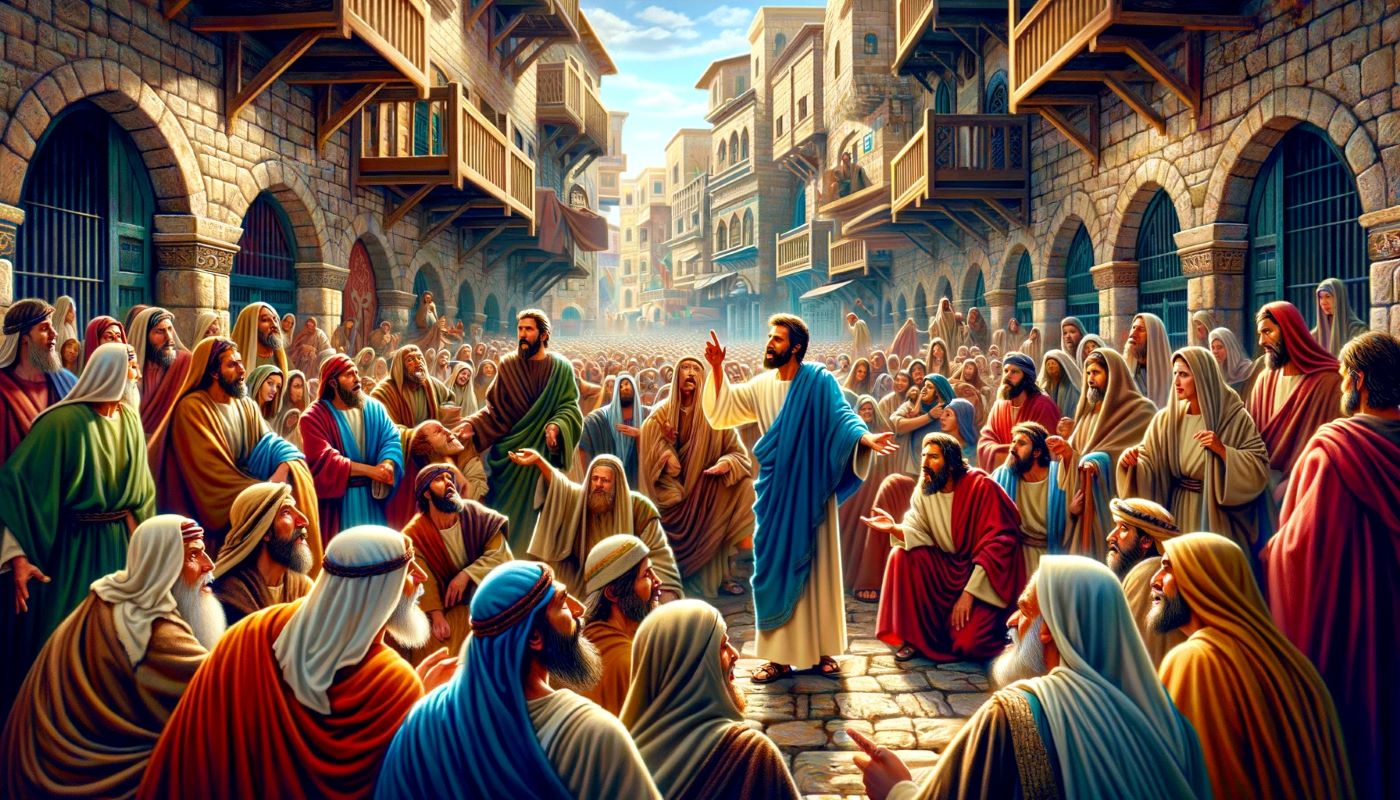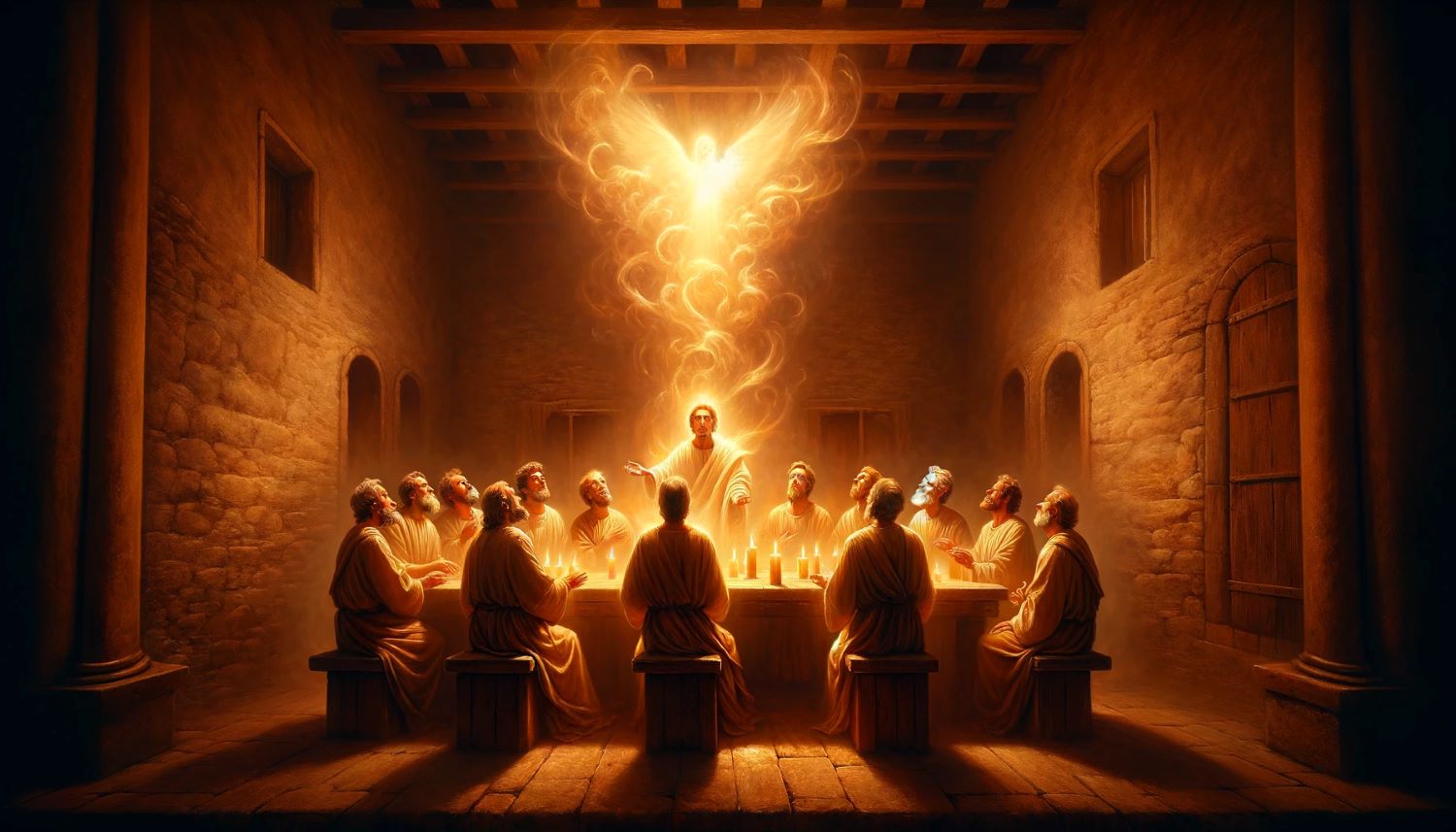Home>Bible Facts>What Happened When The Holy Spirit Descended On The Apostles


Bible Facts
What Happened When The Holy Spirit Descended On The Apostles
Published: February 17, 2024
Peter Smith, Editorial Director at Christian.net, combines deep insights into faith, politics, and culture to lead content creation that resonates widely. Awarded for his contributions to religious discourse, he previously headed a major organization for religious communicators, enhancing dialogue on faith's societal impacts.
Discover the powerful impact of the Holy Spirit's descent on the Apostles with these fascinating Bible facts. Explore the transformative event and its significance in Christian history.
(Many of the links in this article redirect to a specific reviewed product. Your purchase of these products through affiliate links helps to generate commission for Christian.net, at no extra cost. Learn more)
Table of Contents
Introduction
The descent of the Holy Spirit upon the apostles is a pivotal event in Christian history, marking the birth of the Christian church and the empowerment of the apostles to spread the teachings of Jesus Christ. This extraordinary occurrence, known as Pentecost, took place fifty days after Easter, in Jerusalem. The significance of this event reverberates throughout the New Testament and continues to hold profound spiritual and theological importance for Christians worldwide.
The anticipation leading up to Pentecost was palpable, as the apostles, along with other followers of Jesus, gathered in the upper room. They were in a state of expectancy, having been instructed by Jesus to await the promised gift of the Holy Spirit. This promise, made by Jesus before his ascension, filled them with hope and a sense of divine purpose.
As the day of Pentecost arrived, the apostles were gathered together when suddenly, a sound like a mighty rushing wind filled the house. This was accompanied by the appearance of divided tongues, as of fire, which rested upon each of them. This awe-inspiring manifestation signaled the arrival of the Holy Spirit in a profound and visible manner.
The impact of this event was immediate and transformative. The apostles, who had previously been fearful and uncertain, were now filled with boldness and clarity of purpose. They were endowed with the ability to speak in different languages, enabling them to communicate the message of Jesus to people from diverse regions and cultures who had gathered in Jerusalem for the feast of Pentecost.
The descent of the Holy Spirit on the apostles symbolized the fulfillment of Jesus' promise to send a helper and advocate who would guide and empower them. This divine intervention marked a new era in the spread of the gospel and the establishment of the Christian faith. The significance of this event cannot be overstated, as it laid the foundation for the global expansion of Christianity and the enduring presence of the Holy Spirit in the lives of believers.
The impact of Pentecost continues to resonate in the hearts of Christians, serving as a reminder of the ongoing presence and work of the Holy Spirit in the world. This event stands as a testament to the faithfulness of God in fulfilling His promises and equipping His followers to fulfill their calling.
The Descent of the Holy Spirit
The Descent of the Holy Spirit, also known as Pentecost, stands as a momentous event in Christian history, signifying the fulfillment of Jesus' promise to send the Holy Spirit to empower and guide his followers. The account of Pentecost, as recorded in the book of Acts, paints a vivid picture of the extraordinary outpouring of the Holy Spirit upon the apostles.
As the day of Pentecost arrived, the apostles, along with other believers, were gathered in one place. Suddenly, a sound like a mighty rushing wind filled the house, capturing their attention and signaling the onset of a divine manifestation. This auditory phenomenon was accompanied by a striking visual display, as divided tongues of fire appeared and rested upon each of them. This awe-inspiring spectacle was a tangible representation of the Holy Spirit's arrival, filling the room with a sense of divine presence and power.
The impact of this supernatural occurrence was profound and immediate. The apostles, who had previously been grappling with uncertainty and fear, were now filled with boldness and clarity of purpose. They were supernaturally endowed with the ability to speak in languages unknown to them, enabling them to communicate the message of Jesus to the diverse crowd that had gathered in Jerusalem for the feast of Pentecost. This miraculous enablement transcended linguistic barriers, serving as a powerful demonstration of the Holy Spirit's transformative influence.
The Descent of the Holy Spirit at Pentecost marked a pivotal shift in the lives of the apostles, equipping them with the spiritual fortitude and eloquence needed to boldly proclaim the gospel. This divine intervention not only emboldened the apostles but also served as a catalyst for the rapid spread of the Christian faith. The impact of this event reverberated far beyond the confines of the upper room, igniting a spiritual fire that would eventually reach the ends of the earth.
The significance of the Descent of the Holy Spirit extends beyond its historical context, carrying profound theological and spiritual implications for believers. It symbolizes the inauguration of a new era, characterized by the indwelling presence of the Holy Spirit in the lives of believers and the expansion of the Christian church. The outpouring of the Holy Spirit at Pentecost stands as a testament to God's faithfulness in fulfilling His promises and empowering His people to fulfill their divine calling.
In essence, the Descent of the Holy Spirit at Pentecost serves as a defining moment in Christian history, marking the inception of a movement that would forever alter the course of humanity. This extraordinary event continues to inspire and resonate with believers, underscoring the enduring presence and transformative power of the Holy Spirit in the life of the church.
The Impact on the Apostles
The Descent of the Holy Spirit at Pentecost had a profound and transformative impact on the apostles, fundamentally altering their spiritual disposition and empowering them to fulfill their mission with unwavering conviction. Prior to this extraordinary event, the apostles were grappling with uncertainty and fear, still reeling from the crucifixion of Jesus and grappling with the weight of their newfound responsibility. However, the outpouring of the Holy Spirit ushered in a radical transformation within them, equipping them with courage, clarity, and spiritual fortitude.
The apostles, who had previously been hesitant and apprehensive, were now emboldened by the indwelling power of the Holy Spirit. This newfound boldness enabled them to step into their roles as fervent proclaimers of the gospel, fearlessly declaring the message of Jesus Christ to the diverse multitude gathered in Jerusalem. The apostle Peter, in particular, delivered a compelling and impassioned sermon, drawing from the prophecies of Joel and eloquently proclaiming the significance of Jesus' life, death, and resurrection. This remarkable display of boldness and articulation stood as a testament to the transformative impact of the Holy Spirit on the apostles.
Moreover, the apostles were supernaturally endowed with the ability to speak in languages unknown to them, a manifestation of the Holy Spirit's empowering presence. This miraculous enablement facilitated effective communication with the diverse crowd present at Pentecost, transcending linguistic barriers and ensuring that the message of the gospel resonated with people from various regions and cultures. The apostles' newfound linguistic abilities served as a tangible demonstration of the Holy Spirit's transformative influence, enabling them to effectively communicate the profound truths of the Christian faith.
The Descent of the Holy Spirit not only emboldened the apostles but also solidified their unity and sense of purpose. They were united in their mission to spread the gospel and make disciples of all nations, propelled by a shared conviction and a deep sense of divine calling. This newfound unity and resolve empowered the apostles to navigate the challenges and opposition they would inevitably encounter as they embarked on their mission to advance the kingdom of God.
In essence, the impact of the Descent of the Holy Spirit on the apostles was multifaceted, encompassing a radical transformation of their inner disposition, an infusion of boldness and eloquence, and a deepened sense of unity and purpose. This transformative encounter with the Holy Spirit set the stage for the apostles to embark on their mission with unwavering conviction, ultimately catalyzing the rapid spread of the Christian faith and laying the foundation for the establishment of the early church.
The Reaction of the Crowd
The Descent of the Holy Spirit at Pentecost elicited a diverse array of reactions from the crowd that had gathered in Jerusalem for the annual feast. As the apostles, filled with the Holy Spirit, began to speak in languages previously unknown to them, the onlookers were astounded and perplexed. The miraculous manifestation of the apostles speaking in various tongues sparked a mixture of amazement, incredulity, and curiosity among the assembled multitude.
Some members of the crowd were bewildered and astonished, struggling to comprehend the extraordinary phenomenon unfolding before their eyes. They marveled at the fact that the Galilean apostles were speaking in languages native to the diverse regions represented in the audience. This display of linguistic fluency, facilitated by the Holy Spirit, defied conventional explanation and left many in a state of awe and wonder.
Amidst the astonishment, others in the crowd were skeptical and incredulous, questioning the authenticity and significance of the apostles' newfound ability to speak in diverse languages. They sought to rationalize and dismiss the extraordinary events unfolding before them, attributing the apostles' speech to an inexplicable phenomenon or a mere display of confusion.
Additionally, there were those who responded with genuine curiosity and a thirst for understanding. They were captivated by the profound message being communicated by the apostles in their respective languages, recognizing the significance and relevance of the words being spoken. This segment of the crowd was open-minded and receptive, recognizing the divine nature of the apostles' speech and seeking to comprehend the deeper spiritual implications of the unfolding events.
The diverse reactions of the crowd underscored the profound impact of the Descent of the Holy Spirit on the apostles and the subsequent dissemination of the gospel message. The apostles' ability to communicate in diverse languages transcended cultural and linguistic barriers, capturing the attention and stirring the hearts of the assembled multitude. The multifaceted responses of the crowd set the stage for the apostle Peter's impassioned sermon, in which he addressed the crowd, elucidating the significance of the events unfolding before them and proclaiming the transformative message of Jesus Christ.
In essence, the reaction of the crowd at Pentecost serves as a testament to the far-reaching impact of the Descent of the Holy Spirit, underscoring the profound and transformative nature of this extraordinary event. The diverse responses of the crowd laid the groundwork for the apostles to boldly proclaim the gospel and set in motion the establishment of the early Christian church, marking the inception of a movement that would forever alter the course of human history.
The Birth of the Christian Church
The Descent of the Holy Spirit at Pentecost marked the birth of the Christian church, signifying the inception of a movement that would forever alter the course of human history. This extraordinary event, characterized by the outpouring of the Holy Spirit upon the apostles and the subsequent proclamation of the gospel, served as the catalyst for the establishment of the early Christian community.
Following the empowering encounter with the Holy Spirit, the apostles embarked on their mission with unwavering conviction and fervor. The transformative impact of the Holy Spirit infused them with boldness, eloquence, and a deep sense of purpose, propelling them to boldly proclaim the message of Jesus Christ to the diverse multitude gathered in Jerusalem. The apostle Peter, emboldened by the indwelling power of the Holy Spirit, delivered a compelling sermon, elucidating the significance of Jesus' life, death, and resurrection and calling the listeners to repentance and faith.
The response to Peter's sermon was profound, as many in the crowd were deeply moved and convicted by his words. In a remarkable display of divine intervention, about three thousand individuals responded to the gospel message, embracing faith in Jesus Christ and receiving the gift of salvation. This monumental influx of new believers marked the inception of the Christian church, forming a vibrant and fervent community of faith characterized by unity, devotion to the apostles' teaching, fellowship, and prayer.
The birth of the Christian church at Pentecost was characterized by a spirit of unity and communal living, as the believers shared their resources, cared for one another, and worshiped together in a spirit of awe and reverence. The apostles, empowered by the Holy Spirit, performed signs and wonders among the people, further validating the authenticity of their message and drawing others to faith in Christ.
The early Christian community, birthed in the wake of the Descent of the Holy Spirit, served as a beacon of hope and transformation, embodying the transformative power of the gospel and the indwelling presence of the Holy Spirit. The birth of the Christian church at Pentecost laid the foundation for the global expansion of Christianity, as the message of Jesus Christ began to spread rapidly, transcending geographical and cultural boundaries and impacting countless lives.
In essence, the birth of the Christian church at Pentecost stands as a testament to the enduring impact of the Descent of the Holy Spirit, underscoring the transformative power of the gospel and the indwelling presence of the Holy Spirit in the life of the church. This pivotal moment in Christian history set in motion a movement that continues to thrive and impact the world, serving as a testament to the faithfulness of God in fulfilling His promises and equipping His people to fulfill their divine calling.
Conclusion
The Descent of the Holy Spirit at Pentecost stands as a watershed moment in Christian history, marking the inception of a movement that would forever alter the course of human history. This extraordinary event, characterized by the outpouring of the Holy Spirit upon the apostles and the subsequent proclamation of the gospel, served as the catalyst for the birth of the Christian church and the rapid spread of the message of Jesus Christ.
The impact of the Descent of the Holy Spirit on the apostles was profound and transformative, infusing them with boldness, eloquence, and a deep sense of purpose. The apostles, who had previously been grappling with uncertainty and fear, were supernaturally empowered to boldly proclaim the message of Jesus Christ, transcending linguistic barriers and captivating the hearts of the assembled multitude. This empowering encounter with the Holy Spirit set in motion a series of events that would ultimately lead to the establishment of the early Christian community, characterized by unity, devotion to the apostles' teaching, fellowship, and prayer.
The diverse reactions of the crowd at Pentecost underscored the far-reaching impact of the Descent of the Holy Spirit, setting the stage for the apostles to boldly proclaim the gospel and usher in a movement that would transcend geographical and cultural boundaries. The birth of the Christian church at Pentecost marked the inception of a vibrant and fervent community of faith, characterized by a spirit of unity, communal living, and a fervent devotion to the teachings of the apostles.
The transformative impact of the Descent of the Holy Spirit continues to resonate in the hearts of believers, serving as a reminder of the enduring presence and transformative power of the Holy Spirit in the life of the church. This pivotal moment in Christian history stands as a testament to the faithfulness of God in fulfilling His promises and equipping His people to fulfill their divine calling.
In conclusion, the Descent of the Holy Spirit at Pentecost remains a profound and enduring testament to the transformative power of the gospel and the indwelling presence of the Holy Spirit in the life of the church. This extraordinary event serves as a timeless reminder of the faithfulness of God and the empowerment of His people to boldly proclaim the message of Jesus Christ, transcending barriers and impacting the world with the transformative power of the gospel.














